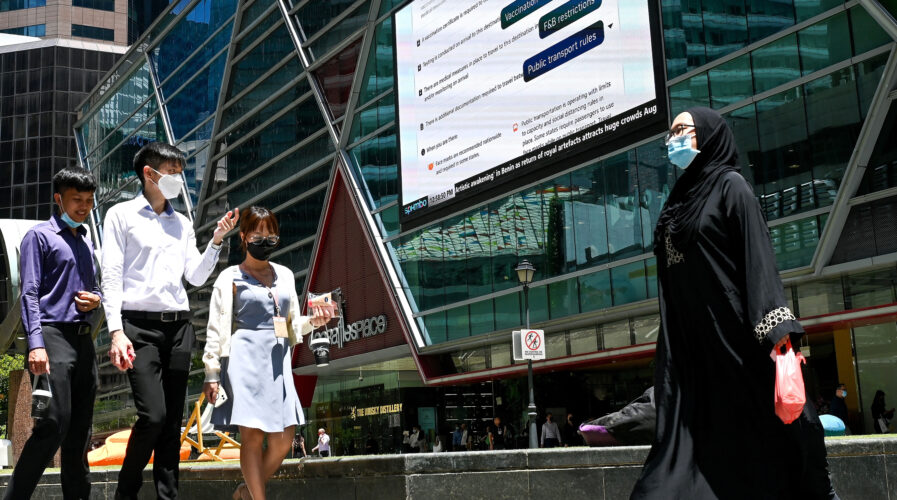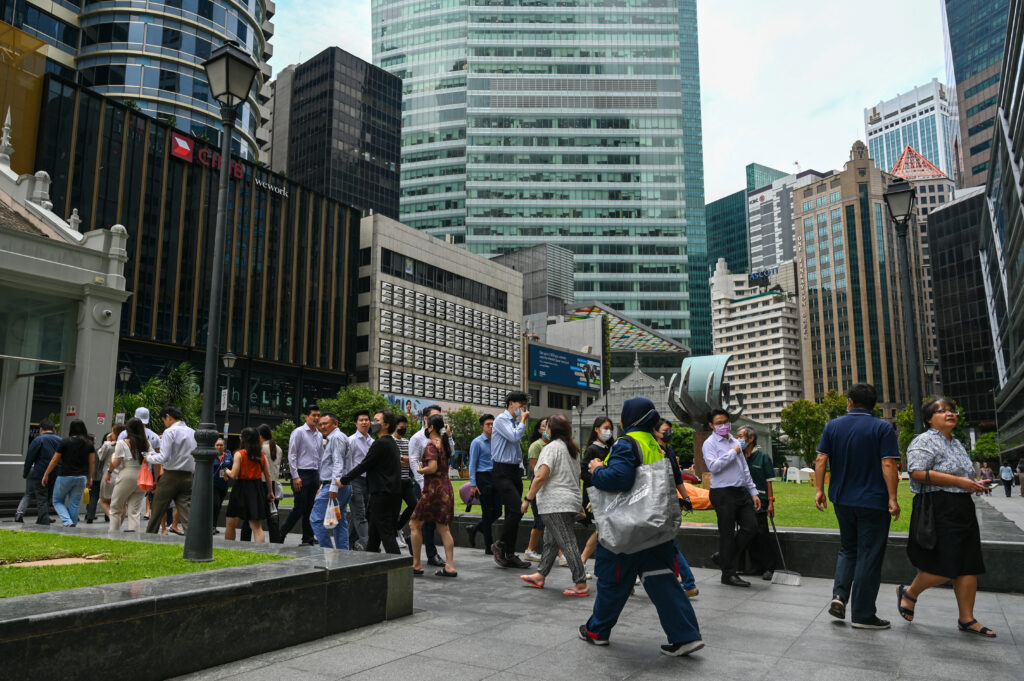
Singapore’s status as global innovation hub might be in doubt as the global shortage of skilled IT workers becomes more pronounced.(Photo by Roslan RAHMAN / AFP)
Singapore mass reskilling IT workers to bridge widening skills gap
Singapore is one of the most advanced technological hubs in the world, regularly ranked as the top innovation center outside of Silicon Valley in the US. But much like other innovation hotspots worldwide, Singapore is facing a rising depletion of skilled IT workers, and has to resort to alternative techniques to ensure the growing IT skills chasm facing the local tech sector does not get out of hand.
Along with “an advanced IT infrastructure, strong government support and IP protection laws,” KPMG reports that Singapore has traditionally been considered to be home to “a deep pool of talent.” But that status might now be in doubt as the global shortage of skilled IT workers becomes more pronounced in the island state.
The 2022 Global Tech Trends survey from digital infrastructure company Equinix found that digital leaders in Singapore have serious reservations about staff retention and recruitment. Well over half (64%) of business technology decision-makers here state a shortage of workers with IT skills to be one of the biggest risks facing their industry.
One of the key barriers is the speed at which the technology scene is evolving, developing faster than organizations can source and retain talent with the right skill sets needed not just for today’s innovations, but equipped with the abilities to adapt to future requirements. Companies, Equinix among them, are looking to bring in more diverse talent “through alternative recruitment drives”.
This presents a unique opportunity for IT workers who have witnessed mass layoffs or voluntary separation schemes decimating the tech industry, to step into those gaps and be retrained with additional skills and development opportunities, with the potential to fast-forward their career advancement. By the same token, tech firms offering these personal development opportunities will likewise be in a better position to attract top-tier tech talent.
To that end, the vast majority (87%) of Singapore businesses surveyed in the 2022 Global Tech Trends Survey are reskilling IT workers to plug those needs.

Office workers walk out for a lunch break at Raffles Place financial business district in Singapore. (Photo by Roslan RAHMAN / AFP)
The findings come on the heels of Slack releasing its newest Leadership and the War for Talent research, which found that one in two Singaporean workers reported feeling burnt out in the past 12 months due to the uncertain macroeconomic climate, poor or uninspired leadership, and the emergence of the ‘quiet quitting’ phenomenon at work.
Meanwhile, 42% of Singapore IT decision-makers are complementing their workforce with recruits from unrelated sectors, but more (62%) are reskilling workers from similar industries. The biggest talent pools for reskilled staff are coming from administrative and business support (40%), manufacturing (23%), finance and insurance (22%), as well as those returning to the workforce after a prolonged absence (21%).
The biggest tech skills gaps for knowledgeable professionals in Singapore are in cloud computing (39%), data analysis (31%), AI/machine learning (26%) and data protection (26%), according to Equinix. Hence reskilled talent might be of direct benefit here, as workers repurposed for digital skills often end up with positions as IT technicians (46%), or cloud computing (45%) and data analysis (30%) roles.
80 of the top 100 global technology companies have a presence in Singapore, including Alibaba, Google, Grab, PayPal, and Zoom, with the city-state serving as a modern, well-equipped gateway to Asia’s broader $26 trillion market and 2.2 billion middle-class consumers. The Singaporean tech scene is possibly the most important innovation ecosystem in the region, and so the challenges facing it are among the most critical. The issues facing it, according to IT leaders, include retaining current talent, adapting to workers’ shifting expectations around acceptable working conditions, and of course – the pay and compensation packages to remunerate employees.
Industries are moving to forward-looking alternatives to recruitment, such as working directly with higher education and apprenticeship programs. Companies mainly explore collaborative training programs with higher education institutes (46%) and offer student internships (37%), but many also take part in university career fairs (32%) and partner on degree apprenticeships (32%) these days.
Companies like Equinix are increasingly investing in upskilling initiatives like its career transition programs, designed to grow talent pools by drawing candidates from adjoining career paths with the necessary crossover skills. Equinix also partnered with the National University of Singapore (NUS) and Singapore Management University (SMU) to offer sustainability scholarships to students, incentivizing them with internship and employment opportunities.
READ MORE
- The criticality of endpoint management in cybersecurity and operations
- Ethical AI: The renewed importance of safeguarding data and customer privacy in Generative AI applications
- How Japan balances AI-driven opportunities with cybersecurity needs
- Deploying SASE: Benchmarking your approach
- Insurance everywhere all at once: the digital transformation of the APAC insurance industry


